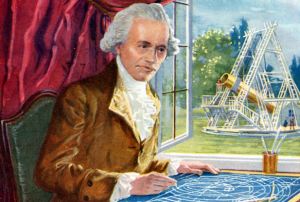picture from: www.redorbit.com
One of my favorite moments in the Neil deGrasse Tyson-hosted show Cosmos: A Spacetime Odyssey takes place in the first moments of one of the first few episodes. It “flashes back” to the early 1800’s, showing a cartoon involving the famous astronomer William Herschel and his young son, John, walking along the beach on a clear evening. John looks up at his father and asks, “Father, do you believe in ghosts?”, to which Herschel responds, “Why yes my son”. Upon seeing his son’s reaction, he clarifies “Oh no, not in the human kind…no, not at all. But look up, my boy, and see a sky full of them”
The young boy has a response typical to the way most would likely respond: confusion and curiosity as to why his father is referring to the stars that they see every night, day after day, as ghosts. Without a clear understanding of physics and astronomy, and probably even with a good understanding of the subjects, it’s certainly a difficult thought to wrap your head around. Due to the vast distances that a majority of the stars in our night sky are located away from our planet Earth, along with the limitation that light can travel no faster than well…the speed of light, the light emitted from these stars may take eons to travel to our eyes allowing them to become visible to us. Some of this light takes SO long to get to us, that there becomes a very real possibility that the stars we are just now beginning to see have already died long ago. This leaves us with just an image of a body that in our current time, doesn’t exist. Now, that sounds pretty ghost-like to me! Although it may not be the most scientific way of describing things, I think that William Herschel was certainly onto something FAR ahead of his time, and something that is still a difficult topic for many to wrap their head around, when he talked to his son about our “sky full of ghosts”.


I think this is a really cool way of looking at things. Ghosts as images of the past, not dead people floating around the air
LikeLike
This was such an interesting way to describe the speed of light and how it affects the stars we see! It always seems hard to explain that we are looking back in time, and farther back as distance increases, when we observe far-away objects in the sky.
I always wonder if there is anything drastic that has happened in the universe that we just haven’t seen yet because we are too far away. Humans didn’t even come into existence until very recently on the cosmic calendar, so if there are similar lifeforms in other galaxies who have launched satellites and expeditions to explore the universe, we might be looking in the right direction but the light just hasn’t gotten to us yet! If humans have already developed the technology necessary to escape Earth’s atmosphere and to send virtual explorers to the edge of our solar system, could we find a way to “fast-forward” the speed of light in order to see the universe as it really exists today?
LikeLike
I agree that this is a really different and cool way of looking at things. So many topics in this class, such as the Cosmic Calendar, the speed of light, and just how big the universe is in general, are so difficult to wrap your mind around, and I really appreciate this unique perspective. I have never seen Cosmos: A Spacetime Odyssey, but I will be sure to watch it sometime now to see moments like the one you described!
LikeLike
It’s great, and on Netflix! It covers a lot of the general topics that we talk about in this class as well! So it’s a good (and entertaining) tool to use to help with this class!
LikeLike